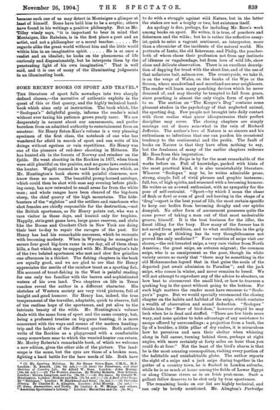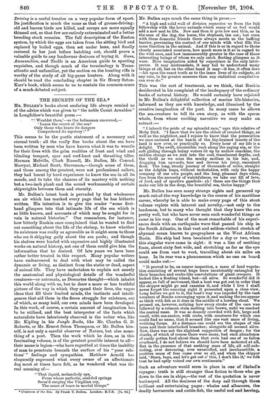Scolopax's " delightful gossip, informs the reader's mind -without ever
taxing his patience grows yearly rarer. We are desperately in earnest about our amusements, and prefer boredom from an admitted authority to entertainment from an amateur. Sir Henry Seton-Karr's volume is a very pleasing -specimen of the first class, the notebook of one who has wandered far afield in search of sport and can write of his doings without egotism or vain repetitions. Sir Henry was one of the pioneers of red-deer shooting in Hitteren. He has hunted elk in the forests of Norway and reindeer on the fjelds. He went shooting in the Rockies in 1877, when bison were still plentiful on the prairies, and no game laws restricted the hunter. Wapiti roamed in vast herds in places which, as Mr. Huntington's book shows with painful clearness, now .know them no more. The beautiful prong-horned antelope, -which could then be shot with ease any evening before pitch- ing camp, has now retreated to small areas far from the white :man ; and whole ranges have been cleared of the big-horn sheep, the chief quarry of the high mountains. The hide- (hunters of the " eighties " and the settlers and ranchmen who shot females are chiefly responsible for the destruction,—not the British sportsman, as Sir Henry points out, who was a -rare visitor in those days, and hunted only for trophies. Happily, stringent game laws, large game reserves, and clubs like the Boone and Crockett Club in New Yolk are doing their best to-day to repair the ravages of the past. Sir Henry has had his remarkable successes, which he recounts with becoming modesty. When in Wyoming he managed to secure four good big-horn rams in one day, all of them clean kills, a feat which may be capped with Mr. Huntington's tale of the two belated sportsmen who met and slew five grizzlies - one afternoon in a thicket. The fishing chapters in the book are equally good, and we are glad to see that Sir Henry appreciates the merits of the rainbow trout as a sporting fish, His account of trout-fishing in the West is painful reading for one only too familiar with the barren and sophisticated waters of his own land. Two chapters on life in Texas ranches reveal the author in a different character. His sketches of Western society are very vivid pictures, full of insight and good humour. Sir Henry has, indeed, the true temperament of the traveller, adaptable, quick to observe, full of the restless hope of the sportsman, and yet alive to the intricate beauty of the wilds. Mr. Huntington's volume deals with the same form of sport and the same country, but, being a professed treatise on big-game hunting, it is more -concerned with the ways and means of the modern hunting- trip and the habits of the different quarries. Both authors -write of the Rockies as a playground with a comfortable ramp somewhere near to which the wearied hunter can return.
• Mr. Morley Roberts's remarkable book, of which we welcome a new edition, gives the other side of the picture. The land- scape is the same, but the eyes are those of a broken man, fighting a hard battle for the bare needs of life. Both have
* (1) My Sporting Holidays. By Sir Henry Seton-Karr, C.M.G., M.P. London: E. Arnold. [12s. 6d. net.]—(2) Iat4o the Fisherman, and other Sketches of Country Life. By Alfred W. Bees. London : John Murray. [10s. 6d. net.1—(S) The Western Avernus. By Morley.Boberte. New Edition. London : Brown, langham, and Co. [3a. 6d.]—(4) Big Game. By Dwight W. Huntington. London: Bickers and Son. [7*. 6d. net.]—(5) A Book of the Snipe. By " Scolopar.." London : W. Blackwood and Sons. [5s. net.]--(6) Partridge Driving. By Charles E. A. Alington. London: John Murray. [5s. net.] — 42) Guns, Ammunition, and Tackle. By Captain A. W. Money, and others. American Sportsman's Library." 'London Macmillan and Co. [8s. ed.)
An apology is due, perhaps, for including Mr. Rees's work among books on sport. He writes, it is true, of poachers and fishermen and the wilds ; but he is rather the reflective essay- ist, quick to seize a vagrant sentiment, an interpreter, more than a chronicler of the incidents of the natural world. His portraits of Ianto, the old fisherman, and Philip, the poacher. both of whom chose their profession not from any instincts of idleness or vagabondage, but from love of wild life, show close and delicate observation. There is an excellent descrip- tion of dapping for trout with the short line, and of the use of that nefarious bait, salmon-roe. The countryside, we take it, is on the verge of Wales, on the banks of the Wye or the Severn, where meadowland and moorland are near neighbours. The reader will learn many poaching devices which he never dreamed of, and may thereby be tempted to fall from grace, since poaching is almost the only virgin form of sport left to us. The section on "The Keeper's Dog" contains some pleasant studies in the psychology of that neglected animal, the sporting dog. Few people not brought into daily contact with them realise what queer idiosyncrasies their perfect discipline may cover. The closing chapters are simply musings out of doors somewhat in the vein of Richard Jefferies. The author's love of Nature is so sincere and his enthusiasm so infectious that one can pardon his occasional tendency to the sentimental and the prolix. The fault of books on Nature is that they have often nothing to say, but the freshness of many of the earlier chapters redeems Mr. Rees from this imputation.
The Book of the Snipe is by far the most remarkable of the works before us. Full of knowledge, packed with hints of the most practical kind, it is also unmistakably literature. Whoever " Scolopax " may be, he writes admirable prose, strong, simple, full of vivid phrases and graphic instances ; full, too, of high spirits, and seasoned with a becoming humour. He writes as an avowed enthusiast, with no sympathy for the pose of self-restraint. "Sport—by which I mean the chase of flesh or fowl or even of good red-herring in the shape of a 'drag'—sport is the best yeast of life, the most certain specific to keep our bodies from becoming doughy and our spirits dumpish. No other form of amusement possesses quite the same power of taking a man out of that most undesirable groove, himself. It is the best business for the idler, the finest idling for the busy. How many of the former has it not saved from perdition, and to what multitudes in the grip of a plague of thinking has its very thoughtlessness not proved the only medicine ? " Four varieties of snipe visit our shores,—the red-breasted snipe, a very rare visitor from North America ; the great snipe, an autumn migrant; the common snipe, who is as omnipresent as the poor, though its white variety occurs so rarely that "there may be something in the old Mohammedan legend that in that guise the souls of the departed just await admission to Paradise "; and the jack snipe, who comes in winter, and never remains to breed. We will not attempt to reproduce any of the advice to shooters, on how best to circumvent the small bird, or how to traverse a quaking bog in the quest without going to the bottom. For such high matters the reader must have recourse to " Scolo- pax's" pages. But we would specially recommend the closing chapter on the habits and habitat of the snipe, which contains a wealth of observation and sound deduction. " Seolopax" thinks him the " Boer of bird-dom," however stupid he may look when he is dead and stuffed. " There are few birds more wary, and none quicker to take advantage of any assistance to escape offered by surroundings a projection from a bush, the lip of a boulder, a little pillar of dry rushes, it is miraculous how he perceives and uses their shelter when whizzing along in full career, turning behind them, perhaps at right angles, with more certainty at forty miles an hour than you could do at four." Not the least of the bird's charm is that he is the most amazing cosmopolitan, visiting every portion of the habitable and uninhabitable globe. The author reports the sight of a snipe and a jack snipe dining together in the gutter of a country town, he is flushed in London suburbs, while he is as much at home among the fields of Lower Egypt or along Chinese rivers as in an Irish peat-moss. Such a gallant fellow deserves to be shot only by true sportsmen.
The remaining books on our list are highly technical, and can only be briefly mentioned. Mr. Alington's Partridge
Driving is a useful treatise on a very popular form of sport. Its justification is much the 'same as that of grouse-driving : old and barren birds are killed, and coveys are more equally thinned out, so that few are entirely exterminated and a better breeding stock remains. The full description of the Euston system, by which the eggs are taken from the sitting bird and replaced by boiled eggs, then set under hens, and finally restored to her just before hatching out, should prove a valuable guide to any landowner desirous of trying it. Guns, Ammunition, and Tackle is an American guide to sporting requisites, and though much of the terminology is Trans- atlantic and unfamiliar, yet the section on the hunting rifle is worthy of the study of all big-game hunters. Along with it should be read the concluding chapter in Sir Henry Seton- Karr's book, which seems to us to contain the common-sense of a much-debated subject.
THE SECRETS OF THE SEA.*















































 Previous page
Previous page